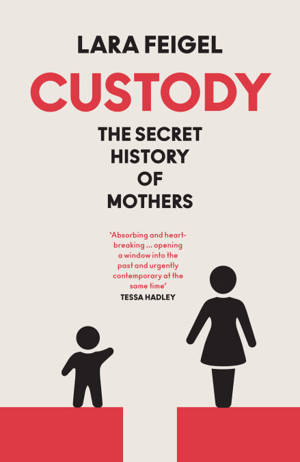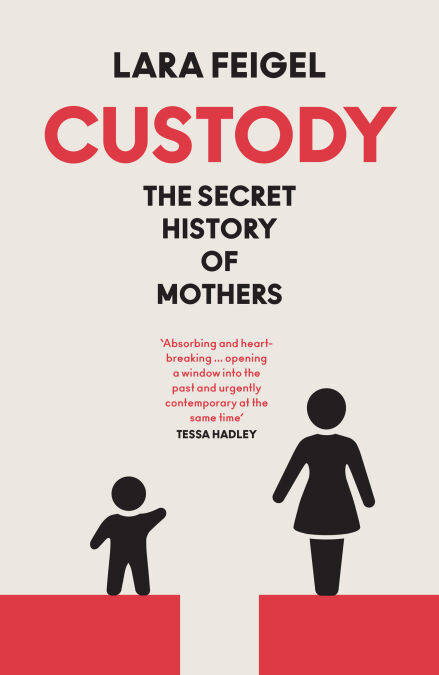
Je cadeautjes zeker op tijd in huis hebben voor de feestdagen? Kom langs in onze winkels en vind het perfecte geschenk!
- Afhalen na 1 uur in een winkel met voorraad
- Gratis thuislevering in België vanaf € 30
- Ruim aanbod met 7 miljoen producten
Je cadeautjes zeker op tijd in huis hebben voor de feestdagen? Kom langs in onze winkels en vind het perfecte geschenk!
- Afhalen na 1 uur in een winkel met voorraad
- Gratis thuislevering in België vanaf € 30
- Ruim aanbod met 7 miljoen producten
Zoeken
€ 27,20
+ 27 punten
Uitvoering
Omschrijving
We think that our children belong to us, but families are fragile things.
Every day, for over a century, children have been moved between homes because of law cases that decide their fates. Yet child custody is curiously absent from history books and from how we generally understand our world. Lara Feigel’s groundbreaking book shows the fraught, complex territory of child custody to have been one of the vital battlegrounds of modern history and culture.
Custody is the story of seven women – Caroline Norton, George Sand, Elizabeth Packard, Frieda Lawrence, Edna O’Brien, Alice Walker, Britney Spears – who have fought for their children and been found wanting. It is also the story of the children who have lost the care they most need because divorce is at heart a macabre continuation of matrimony in a new setting, with the battles of the marriage stoked into new levels of acrimony by the courts.
It’s a book of dramatic storytelling, and of blistering polemic and large-scale historical re-evaluation. Each chapter immerses the reader in the life and times – and struggles – of these fascinating, charismatic, complex women and their children. All of these women were mothers, but all of them wanted and needed to be other things too – writers, lovers, or activists – and they and their children were punished for these attempts.
Feigel has been deep in the archives, looking into thousands of other cases in each place and time, and she’s been sitting in on the family courts in the present. So alongside these central figures, the book presents a teeming picture of fractured family life in Britain, Europe and North America across two hundred years, offering a major new interpretation of how our modern culture has evolved. And Custody is an alternative history of feminism, centring on the fraught relationship between emancipation and care.
This book is of urgent interest to anyone concerned with women’s roles in the world and how institutions fail them. Ultimately it’s a book that sees custody as the nexus where motherhood, ideology and power meet. Custody cases can seem in these chapters to be quintessentially tragic, but the stories of these passionate, conflicted women also make us want to figure out how to do things better.
Every day, for over a century, children have been moved between homes because of law cases that decide their fates. Yet child custody is curiously absent from history books and from how we generally understand our world. Lara Feigel’s groundbreaking book shows the fraught, complex territory of child custody to have been one of the vital battlegrounds of modern history and culture.
Custody is the story of seven women – Caroline Norton, George Sand, Elizabeth Packard, Frieda Lawrence, Edna O’Brien, Alice Walker, Britney Spears – who have fought for their children and been found wanting. It is also the story of the children who have lost the care they most need because divorce is at heart a macabre continuation of matrimony in a new setting, with the battles of the marriage stoked into new levels of acrimony by the courts.
It’s a book of dramatic storytelling, and of blistering polemic and large-scale historical re-evaluation. Each chapter immerses the reader in the life and times – and struggles – of these fascinating, charismatic, complex women and their children. All of these women were mothers, but all of them wanted and needed to be other things too – writers, lovers, or activists – and they and their children were punished for these attempts.
Feigel has been deep in the archives, looking into thousands of other cases in each place and time, and she’s been sitting in on the family courts in the present. So alongside these central figures, the book presents a teeming picture of fractured family life in Britain, Europe and North America across two hundred years, offering a major new interpretation of how our modern culture has evolved. And Custody is an alternative history of feminism, centring on the fraught relationship between emancipation and care.
This book is of urgent interest to anyone concerned with women’s roles in the world and how institutions fail them. Ultimately it’s a book that sees custody as the nexus where motherhood, ideology and power meet. Custody cases can seem in these chapters to be quintessentially tragic, but the stories of these passionate, conflicted women also make us want to figure out how to do things better.
Specificaties
Betrokkenen
- Auteur(s):
- Uitgeverij:
Inhoud
- Aantal bladzijden:
- 432
- Taal:
- Engels
Eigenschappen
- Productcode (EAN):
- 9780008655471
- Verschijningsdatum:
- 14/01/2026
- Uitvoering:
- E-book
- Beveiligd met:
- Adobe DRM
- Formaat:
- ePub

Alleen bij Standaard Boekhandel
+ 27 punten op je klantenkaart van Standaard Boekhandel
Beoordelingen
We publiceren alleen reviews die voldoen aan de voorwaarden voor reviews. Bekijk onze voorwaarden voor reviews.









